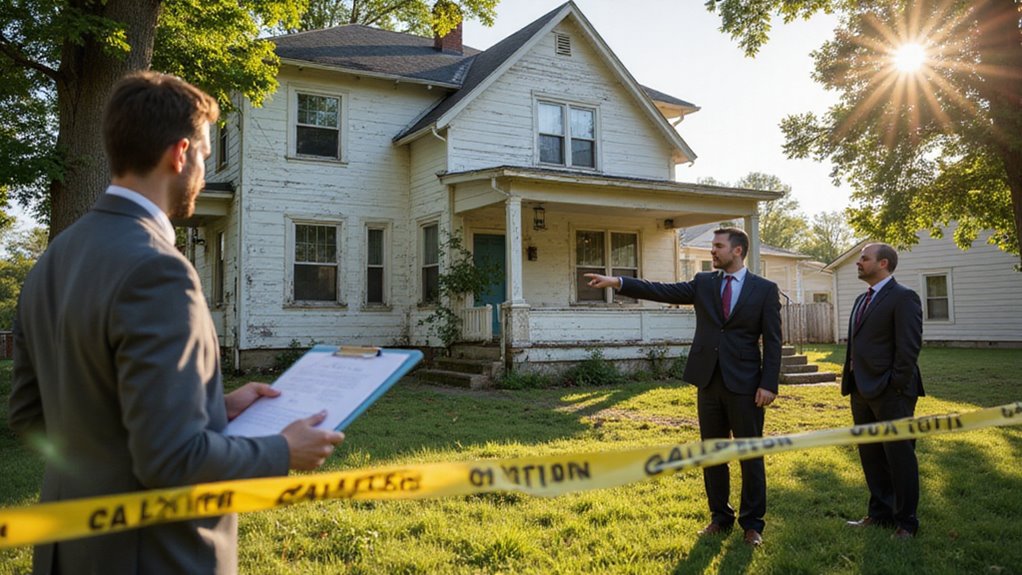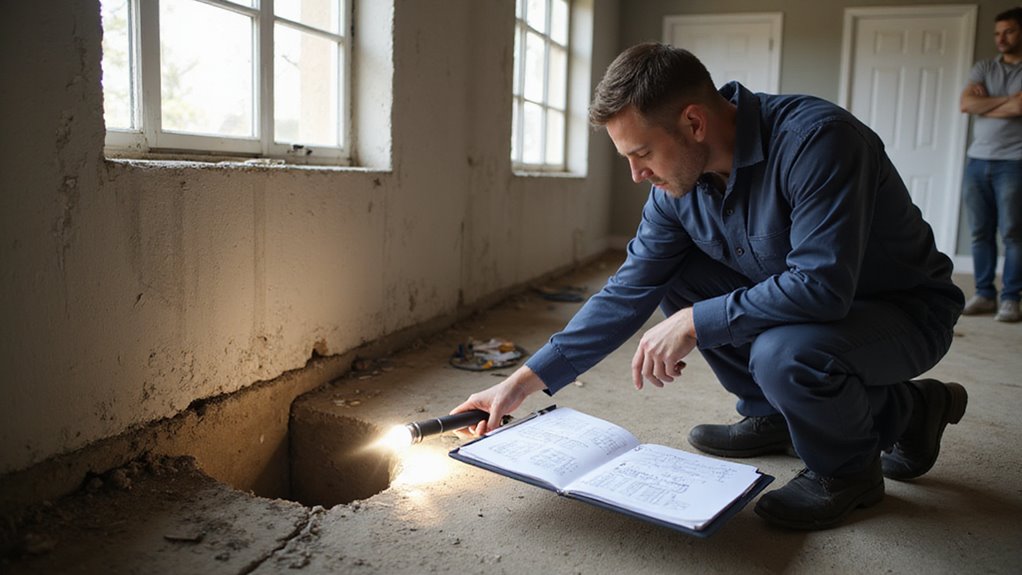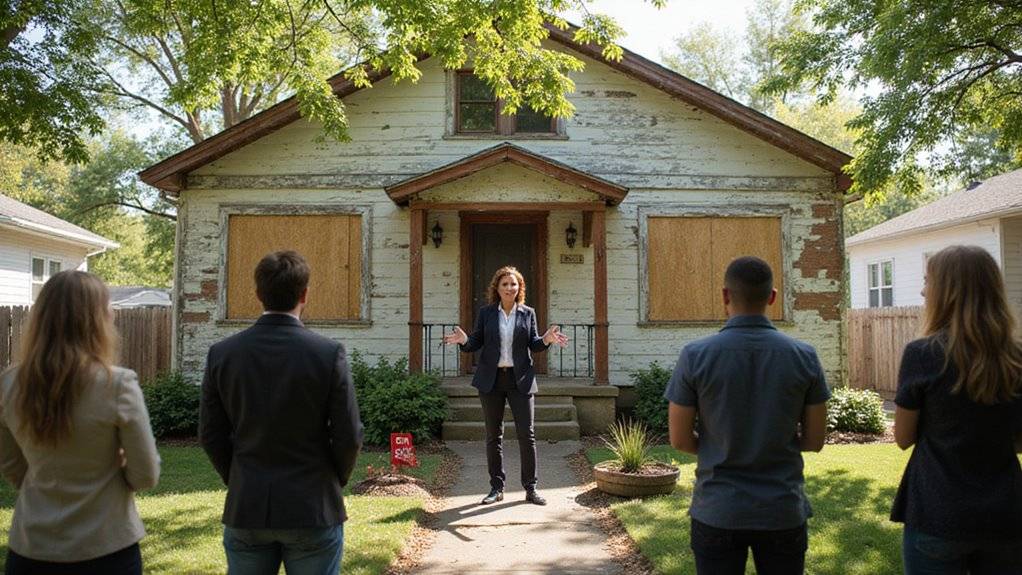Selling a house with code violations can feel overwhelming. Many buyers hesitate to take on homes with electrical problems or unapproved changes. These issues can make selling quickly and for a good price very difficult.
Buyers may walk away after inspections reveal costly repairs. The longer your home stays on the market, the more money and time you lose.
Unaddressed violations can even lead to legal trouble or fines. The best way to sell a house with code violations fast is to understand your options and target the right buyers.
With the right strategy, you can avoid delays and get the best possible offer. This blog will guide you through each step to help you find solutions and sell faster.
Key Takeaways
- Disclose all known code violations transparently to buyers to avoid legal issues and build trust.
- Target investor and cash buyers who specialize in purchasing as-is properties with code violations.
- Obtain a professional inspection to accurately assess and document all violations before listing.
- Offer price reductions or seller credits as incentives to attract buyers willing to handle repairs.
- Market the property’s renovation and investment potential to highlight future value despite current violations.
Understanding Common Types of Code Violations

Properties can develop code violations even with regular maintenance. Common problems include electrical hazards, plumbing leaks, and damaged roofs. Other frequent issues are missing smoke detectors and unsafe handrails.
Local building codes often list inadequate ventilation or unapproved home changes as violations. If you do not follow these codes, you may risk safety or face trouble when selling. Code violations can lower your property’s value. Sellers in O’Fallon who want to avoid the hassle of repairs often turn to as-is cash buyers for a faster solution.
If you check your property regularly, you can find and fix problems early. Knowing common violations helps you plan repairs and communicate with buyers. If you address or disclose issues, the sales process will be easier. Often, properties with unresolved violations are best sold as-is, since making repairs may be too costly or time-consuming for the seller.
Assessing the Severity of Your Property’s Violations
You need to find out how serious your property’s code violations are. Some issues are minor, while others may stop a sale. If you know the severity, you can decide what to fix first.
Minor problems, like chipped paint or missing handrails, are usually easy to repair. These issues do not often scare away buyers or lower the price much. If you fix them, your property may become more appealing. For homeowners in Florissant, working with cash home buyers can help you sell quickly even if minor issues are present.
Major violations are more serious. Issues like structural damage or illegal additions can lower your home’s value. If a buyer needs a loan, these problems may block their financing.
Each violation should be grouped by how it affects safety, livability, and local rules. This way, you can focus on what matters most. If you tell buyers about these issues, they will know what to expect.
It’s also important to disclose all known problems to potential buyers, as failing to do so could lead to legal responsibility or even lawsuits later on.
Getting a Professional Inspection

A professional inspection is the best way to find all issues with your property. An inspector checks for both visible and hidden problems. This helps you understand what needs fixing before selling. Most buyers will ask for an inspection before closing. If you know what they might find, you can plan ahead. This information helps you avoid surprises during negotiations.
You should also arrange a code assessment with your local building department or a qualified contractor. They can spot code violations that you might miss. Fixing these issues early can prevent delays in your sale. If you work with a family-owned local business that buys houses as-is, you may not need to worry about repairing code violations before selling.
If you gather all this information in advance, you can make better decisions. Accurate disclosures increase buyer trust. This makes your property more appealing to serious buyers.
For homeowners who want a stress-free selling experience, working with local experts who buy houses as-is can help you skip worrying about repairs and code violations altogether.
Calculating the Costs of Repairs Versus Selling As-Is
To decide between repairs or selling as-is, compare repair costs with the potential selling price. Calculate the total cost for each code violation. If repairs cost more than the value they add, selling as-is may be better.
Repairing the home often increases its value but requires more time and money. Selling as-is is usually faster but attracts fewer buyers, mainly investors. If you need to sell quickly, selling as-is can be the right choice. Keep in mind that special circumstances such as multiple owners or unique legal issues can further affect your selling options and timeline. Sellers in St. Peters, MO can benefit from fair cash offers that eliminate the need for repairs and speed up the closing process.
Check the table below for a quick comparison:
| Factor | Repair & Sell | Sell As-Is |
|---|---|---|
| Repair Estimation | High | $0 |
| Property Valuation | Potentially Higher | Lower |
| Time to Close | Longer | Faster |
| Buyer Pool | Larger | Often Investors |
Reviewing these points can help you choose the most profitable option for your situation.
Disclosing Code Violations to Potential Buyers

You must meet legal disclosure requirements by informing buyers about any known code violations, as failure to do so can lead to lawsuits and stalled sales. Studies show that transparent sellers gain buyer trust, often resulting in smoother negotiations and quicker closings. By proactively sharing this information, you set clear expectations and protect yourself from future disputes.
Additionally, working with local North County, MO buyers who are experienced in handling properties with code violations can make the process even more efficient and stress-free. Being open about issues, such as foundation problems, can directly impact buyer confidence and the overall success of your sale.
Legal Disclosure Requirements
State laws require sellers to disclose any known code violations when selling a house. You must give buyers a written list of these problems. This list should include details about hazards and zoning issues.
Sellers must mention environmental hazards, such as asbestos or lead paint. You should also include any zoning restrictions that may affect future property use. If you do not disclose these issues, buyers may cancel the sale or sue.
Buyers have the right to know the property’s true condition. You should collect all inspection reports and city notices before listing the home. Sharing this information helps you follow the law and avoid legal trouble.
Building Trust With Transparency
Sellers build trust by sharing all known code violations from the start. This honesty helps buyers feel confident and secure. If sellers are open about issues, buyers are less likely to feel surprised later.
Clear information can shorten negotiations by up to 30%. Sellers who provide documents and explain repairs show they are responsible. Buyers value knowing what problems exist and what has been done.
If you are upfront about your property’s flaws, you can avoid last-minute problems. Investors may even prefer homes with known risks. Being transparent can speed up the sale and lower the chance of legal trouble.
In today’s market, honesty is not only right—it helps homes sell faster. Reliable sellers stand out and make the process smoother for everyone.
Marketing Your Home to Investors
When you market your home to investors, focus on highlighting the strong capacity for renovation profits and the appeal of an as-is sale. Investors often seek properties with code violations because they can buy at a discount and make targeted improvements. By positioning your home as a value-driven opportunity, you attract buyers ready to move quickly and handle repairs themselves.
Since many local investors specialize in buying houses as-is and can offer fast closings with no agent fees or commissions, you may find the process much more straightforward than a traditional sale. Additionally, some investors are motivated by capital gains tax exclusion opportunities, as they may be able to offset profits if they meet specific IRS requirements when selling renovated properties.
Highlighting Investor Opportunities
Homes with code violations can attract investors looking for deals. If a property is priced below market value, investors may see profit potential. They often buy, repair, and resell these homes.
Marketing should focus on possible returns, not flaws. Show data on recent sales and renovation costs. If the resale value is high, investors are more interested.
Staging and curb appeal help investors see the property’s potential. Even small improvements can make a big difference. According to the National Association of Realtors, staged homes sell much faster.
If you position your home as a good investment, you may attract cash buyers. Investment groups often move quickly on promising properties. This approach can increase your chances of a fast sale.
Emphasizing As-Is Potential
Investors want homes they can buy quickly and easily. If you market your home as-is, highlight the fast and simple process. Buyers will not need to worry about repairs or long negotiations.
A clear description of your property’s potential can attract more investors. If you show what the home could become, buyers may see more value.
Simple steps like mowing the lawn or painting the front door can help. These improvements can make the home look better, even if there are code issues. Your home becomes a blank slate for investors who want to renovate and profit.
Highlighting the Property’s Potential

Emphasizing your property’s potential can attract serious buyers, even if there are code violations. Buyers often look past flaws when they see clear advantages and future possibilities. You can make your home stand out by showing what it could become.
Staging the property helps buyers picture themselves living there. Industry data shows 83% of buyers find it easier to imagine a home’s potential when it is staged. If you invest in curb appeal, you could make a strong first impression, as 94% of buyers say this matters.
You should highlight areas where buyers can renovate or expand. If buyers see options for customization, they may value the property 20% higher. Marketing to investors or people seeking fixer-uppers can also increase interest. Selling to local investors who understand the West County real estate market can make the process smoother and ensure you get a fair cash offer.
If you present expansion potential, buyers might see a good long-term investment. This often leads to higher future resale values. Focus your marketing on these strengths if you want more offers.
For sellers who want to avoid the hassle of repairs, working with buyers who purchase houses in any condition can be a fast and effective way to highlight your property’s strengths and close quickly.
Negotiating With Buyers Who Expect Repairs
When buyers want repairs, you need a plan to keep negotiations fair. You should protect your profit while meeting reasonable requests. If you stay organized, you can guide the process smoothly.
A well-staged home helps buyers focus on its positive features. Staging can make buyers overlook minor issues and code violations. The National Association of Realtors says staged homes sell much faster.
You should provide a recent home appraisal to show the property’s value. This can help if buyers ask for too many repairs. The appraisal gives you facts to support your decisions.
If buyers raise concerns, address them directly. Use the appraisal and highlight the home’s potential after repairs. By being open and using data, you keep negotiations on track.
Choosing to work with a local St. Charles County real estate market expert can make negotiations easier and more transparent, since they understand the unique challenges and buyer expectations in the area.
Offering Seller Credits or Price Reductions

You can boost buyer interest by offering seller credits or strategic price reductions, especially when targeting investors who value discounts.
Data shows that homes with allowances for repairs often sell faster, as buyers factor these savings into their renovation budgets. By negotiating clear repair credits, you give buyers flexibility while keeping your listing competitive in a challenging market.
Attracting Investors With Discounts
Offering discounts is a proven way to attract investors to properties with code violations. Investors want to see a clear path to profit. Strategic discounts, based on accurate property values and market data, make your property stand out.
Seller credits help investors by lowering their upfront costs if repairs are needed. A price reduction gives immediate equity, making the property more attractive if local sales support the price. Bulk discounts can appeal to those looking to buy multiple properties, especially if market trends show gains in larger portfolios.
If you highlight repair estimates, investors can better calculate their returns. Comparing your price to recent sales data helps prove the value. Analyzing trends for multiple properties will attract buyers interested in growing their portfolio.
Negotiating Repair Allowances
Negotiating repair allowances helps sellers overcome code violations that can turn buyers away. Sellers can offer credits or lower the price to offset repair costs. This makes the home more appealing to both investors and regular buyers.
If you offer a repair credit, the buyer can fix issues later in their own way. Homes with repair allowances often sell faster because buyers have more flexibility. Price reductions or credits can remove obstacles during negotiations and help close the deal quickly.
Always document all violations and get clear estimates for repairs. Present these details to buyers to show you are honest and prepared. This builds trust and helps you achieve a smooth and successful sale.
Working With Real Estate Agents Experienced in Problem Properties
Working with a real estate agent who knows problem properties makes selling homes with code violations easier. These agents understand how code issues affect property value and buyer interest. They can help you find the right buyers.
Agents with experience know how code violations change property taxes and safety perceptions in the neighborhood. If you want to sell quickly, their market knowledge is helpful. They also have contacts with buyers who are open to repairs.
An experienced agent uses special marketing to reach people interested in fixer-uppers. If you want a good price, their strong negotiation skills can help. Choosing the right agent makes selling your problem property simpler.
Exploring Cash Buyer Options
You can often sell a house with code violations faster by considering cash buyer offers, which typically close in as little as 7 to 14 days. Cash buyers also purchase properties as-is, saving you from costly repairs. To protect your interests, research local investor reviews and verify credentials before accepting an offer.
Benefits of Cash Offers
Cash offers make selling a house with code violations faster and easier. If you choose a cash buyer, you avoid most delays. This is because cash buyers do not need a mortgage.
Most cash buyers accept the home “as-is,” so you skip repairs and staging. You save money by not fixing code problems. If you want to sell quickly, a cash offer is a good choice.
Cash sales usually close in less than two weeks. These deals rarely fall through, giving you peace of mind. If you want a simple sale, a cash offer stands out.
Finding Reputable Investors
To find reputable investors, check their history and reputation first. Look for investors who have handled similar properties before. If an investor has experience with code violations or environmental hazards, they may close deals faster.
You should always check reviews and BBB ratings before making a decision. Real investors offer clear contracts and explain each step. If an investor conducts thorough property checks, they are more likely to be trustworthy.
A reliable investor will understand local rules and solve problems quickly. If you choose an experienced cash buyer, you can sell your property faster. This approach can save time and reduce unexpected costs.
Navigating Local Laws and Regulations
Understanding local laws and rules is key when selling a house with code violations. Every city has its own property and zoning laws. You must follow these rules to avoid problems during your sale.
Know your city’s property and zoning laws before selling a home with code violations to avoid issues during the process.
Zoning laws decide how you can use your property. Check your city’s code to see if your property use fits the rules. If you do not follow zoning laws, your sale could be delayed.
Property permits show that work done on your home was approved. If permits are missing, buyers or inspectors may worry. Always check that you have all needed permits.
If you have questions, contact your city or county office. Local officials can explain what you must do to stay legal. This helps prevent surprises when you list your home. Following each step helps you sell faster and with fewer problems. Staying informed protects you and your sale.
Preparing the Necessary Documentation for a Smooth Sale
To have a smooth sale, you need to prepare the right documents. Gather all papers related to your home’s code violations. This will help you answer buyer questions quickly.
Include inspection reports, repair estimates, and any letters from local authorities. Permits for completed work and receipts for repairs are also important. These documents show buyers you have managed issues responsibly.
Accurate paperwork helps you explain your price if buyers ask. Cash buyers or investors often want detailed records. Homes with full disclosure usually sell faster than those with missing information.
Clear and organized documents make negotiations easier. If you provide everything upfront, you can avoid delays. Buyers are more likely to trust you and consider your property seriously.
Streamlining the Closing Process
Streamlining the closing process means making the sale move quickly and smoothly. Code violations can slow down sales or even stop them. Clear communication and good planning help avoid these problems.
An experienced real estate attorney should be involved early. This ensures all legal requirements are covered and surprises are avoided. Attorneys can spot and solve issues before they grow.
Sellers must keep everyone updated about code violations. Buyers, agents, and title companies should all know the status of repairs. If everyone is informed, the process moves faster.
All documents should be ready before closing begins. Inspection reports, repair estimates, and disclosure forms need to be complete. If documents are prepared, buyers can make decisions quickly.
Conclusion
If you need to sell a house with code violations, taking the right steps can make the process easier. If you calculate repair costs and communicate honestly with buyers, you increase your chances of a quick sale. When you follow local laws and keep your paperwork organized, you limit potential problems.
If you want to sell fast, cash buyers are a good option. Investors are often willing to buy homes with code issues as-is. If you price your home right and share all details, you attract serious buyers.
If you are ready to sell, we buy houses for cash at Freedom Path Investors. We can help you move on from a problem property quickly and easily. Contact us today to get started and see how we can help you.







